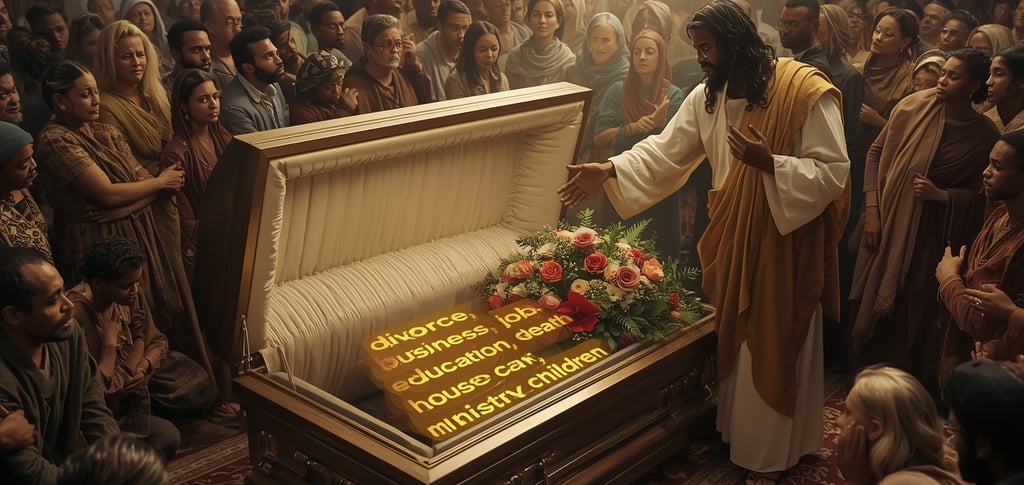It’s NEVER Too Late: What Jesus’ Tears at Lazarus’ Tomb Teach Us
Scripture Focus: 3 John 1:1-2. John 11:25
Linda F. Williams, M.Ed., M.Th.
9/18/20254 min read


The Weight of Disappointment
Disappointment has a way of knocking the wind out of us. It’s not just sadness—it’s the ache of unmet expectations, the sting of broken hope, the heavy silence when what we prayed for never seems to come. It sneaks in when the phone call brings bad news, when the opportunity slips through our fingers, when the prayer we prayed doesn’t turn out the way we hoped. Disappointment can leave us hollow, questioning, and even angry at God. And disappointment, if left unchecked, can unravel into depression and anxiety. It makes us feel paralyzed, stuck in grief that keeps replaying itself in our hearts.
But tucked into one of the most powerful miracles in Scripture—the raising of Lazarus—we see disappointment from a divine perspective.
The story of Lazarus in John 11 captures the feeling of being paralyzed and stuck in the grief of disappointment perfectly. Mary and Martha believed Jesus could heal their brother, but when He arrived “too late,” Lazarus had been dead four days. Their faith was in the resurrection to come, some distant hope in the future. But they couldn’t see the Resurrection standing right in front of them.
Why Did Jesus Weep?
It’s one of the shortest and most profound verses in Scripture: “Jesus wept.” (John 11:35)
The crowd assumed His tears were the same as theirs—tears of grief over Lazarus’ death. But Jesus’ tears ran deeper. He knew Lazarus would rise again in a matter of moments. His disappointment wasn’t in death itself but in their inability to believe. They spoke about the resurrection as if it were far away, while the Resurrection was speaking to them face-to-face. They were actually talking to what they had been talking about.
Think about that. The very thing they longed for was the very One they were leaning on. They were standing by what they had been standing on. Yet they couldn’t recognize it in the moment. That’s the heartbreak of disappointment—it blinds us. We become so fixated on what we lost that we miss the greater reality God is standing beside us.
How often does disappointment blind us in the same way?
The Hidden Gift of Disappointment
We cry because something has ended. We mourn opportunities that never bloomed, relationships that failed, careers that crumbled. Our hearts break under the weight of “what could have been.” Meanwhile, Jesus weeps—not because He cannot restore—but because we often forget that He is The Restoration. We cry at the tomb while standing beside the Resurrection and the Life Himself.
Disappointment is powerful. It can push us into seasons of depression, anxiety, and hopelessness. But it is also an invitation. Disappointment strips away illusions and forces us to face what we truly believe. Will we let it bury us, or will we allow God to reveal Himself in ways bigger than we imagined?
When we are crushed by unmet expectations, it feels like the end. But disappointment is often the threshold of revelation. Mary and Martha wanted healing. Jesus gave them resurrection. They wanted restoration. Jesus revealed Himself as Life itself.
Disappointment strips away illusions and forces us to confront what we’re really standing on. Are we clinging to the outcome we wanted, or to the God who holds outcomes in His hands? Sometimes God allows seasons of disappointment so that He can reveal something far greater—something eternal that shakes us free from shallow hope.
When Jesus raised Lazarus, He did more than bring one man back from the grave. He redefined disappointment. He showed that what we call “the end” can become a stage for God’s greatest glory. What we label as “loss” may simply be the soil for something far greater to grow.
When Disappointment Leads to Darkness
Let’s be honest: disappointment can leave scars. Depression and anxiety often trail behind it like shadows. We wrestle with questions like: Why didn’t God show up? Why wasn’t my prayer answered? Why did I lose what I held so tightly?
But even in the pit of despair, we are not abandoned. The same Jesus who wept with Mary and Martha weeps with us. He is not unmoved by our tears. He meets us in the ache, not to scold us, but to lift our eyes to see that He is more.
If you are standing in the middle of disappointment today, remember this: Jesus is weeping with you. But He is also pointing you beyond the grave, beyond the loss, beyond what you can see. His tears are a call to lift your eyes and see that He is the resurrection, the hope, and the new beginning.
Hope Beyond the Grave of Disappointment
The miracle of Lazarus is a reminder that what feels final is never the end when Jesus steps into the scene. Your disappointment may feel like a sealed tomb, too heavy to move, too final to change. But Jesus has the power to call forth life where everything seems dead.
The stone you thought would never roll away? Can be REMOVED!
The situation you thought was too far gone? Can be REDEEMED!
The hope you buried years ago? Can be RESURRECTED!
Call to Action
I don’t know what disappointment you’re carrying today. But I know this: Jesus is standing beside you, not only as Comforter but as Resurrection and Life. Whatever disappointment you are holding onto today, bring it honestly before God. Write it down. Name it. Cry if you must. But then ask Him to show you how He wants to turn this moment into something greater than you imagined. Remember—you may be staring at a tomb, but you are also standing beside the Resurrection.
Don’t let your grief blind you to His presence. Let your disappointment push you deeper into His arms.
Take your tears to Him. Tell Him your fears. Release your unmet expectations into His hands. And dare to believe that He can bring forth something greater than you imagined.
Because with Jesus, disappointment is never the end of the story—it’s the doorway to resurrection.
